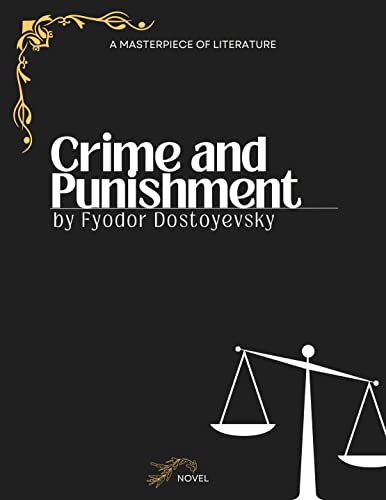Crime and Punishment (annotated edition)
Fyodor Dostoyevsky
BOOK REVIEW

In a world where morality is a battlefield, Crime and Punishment stands as a grim and compelling testament to the struggle of the human psyche. Fyodor Dostoyevsky's magnum opus plunges you into the murky depths of guilt, redemption, and the quest for identity, brilliantly dissecting the complexities of morality in a society ravaged by poverty and despair.
The story follows Raskolnikov, a former student in St. Petersburg who, in a fit of arrogance and disillusionment, commits a heinous act-murdering a pawnbroker. This act of terror isn't merely a crime; it engulfs him in a whirlpool of existential dread that will grip your very soul. As you traverse alongside him, your heart races with each beat of dread and anticipation. Will he confess? Can he withstand the self-imposed torment of his conscience? Dostoyevsky invites you inside Raskolnikov's mind, a place where reason collides with madness, creating a landscape as chaotic as the city itself.
What makes Crime and Punishment resonate deeply, even today, is its unflinching exploration of ideas that ignite passion and fury. Dostoyevsky challenges you directly-daring you to ponder the very nature of justice and what it means to be a good person in a world fraught with inequality. This novel rips apart the façade of human morality, exposing the raw nerves of our fears and desires. You will both loath and empathize with Raskolnikov, your emotions a roller coaster ride that refuses to let you off at any moment.
Critics and readers alike have found themselves polarizing between admiration and disdain for the protagonist. Some hail him as a tragic hero, a victim of circumstance and an embodiment of Dostoyevsky's philosophical inquiries. Others argue he represents the darkest corners of humanity and selfishness. Each perspective unlocks a new door into the heart of the narrative, encouraging profound reflection on our own beliefs.
Historically, Crime and Punishment emerged from the turbulent socio-economic landscape of 19th century Russia, a time when existentialism began to rear its head. Dostoyevsky was directly influenced by his experiences in Siberian exile, an ordeal that etched deep scars into his understanding of human nature and redemption. His life's struggles breathe life into Raskolnikov's journey, imbuing it with a realism that transcends time, sparking dialogues across generations about crime, punishment, and the meaning of life itself.
As a modern reader, you can't help but feel the weight of contemporary issues mirrored in this narrative. The class struggles and moral dilemmas faced by Raskolnikov resonate eerily with today's societal landscape, demanding your attention and action. Readers often walk away with a new lens through which to examine their own lives, ignited by the transformative potential of Dostoyevsky's prose.
Don't let this opportunity to delve into the depths of Crime and Punishment slip through your fingers. Grab hold of this literary whirlwind that promises to shake the very foundations of your understanding of morality. This isn't just a book; it's a challenge-to reflect, to grow, and, ultimately, to awaken something profound within yourself that yearns for inquiry and understanding. Embrace it, and let your journey through the darkness lead you to the light of revelation. 🌍✨️
📖 Crime and Punishment (annotated edition)
✍ by Fyodor Dostoyevsky
🧾 636 pages
2023
#crime #punishment #annotated #edition #fyodor #dostoyevsky #FyodorDostoyevsky